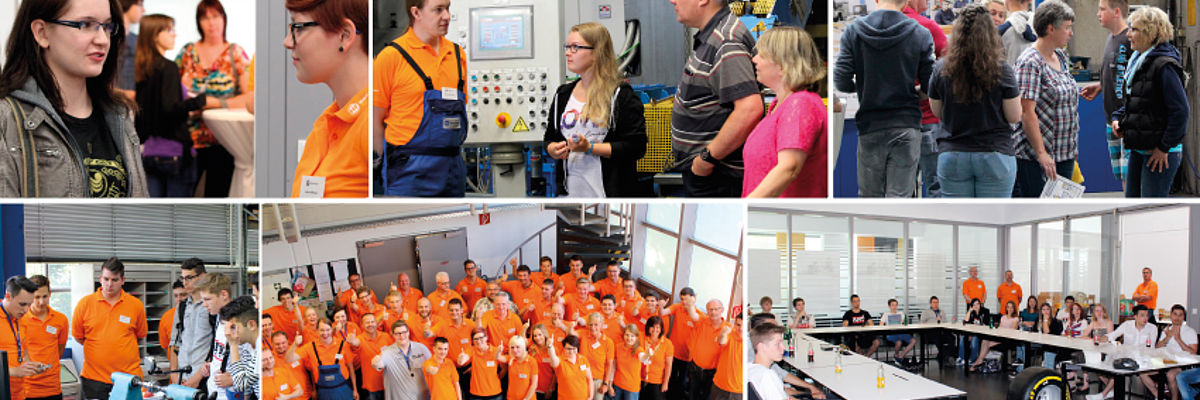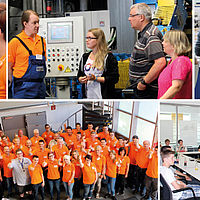There is no doubt about it: against the background of demographic change, Germany’s labour market is undergoing a dramatic transformation. Experts speak of an inversion of traditional conditions. The classic employer’s market is mutating into an employee’s market – with all of the associated consequences. Many companies are completely unprepared for this development. Everyone is amazed that so-called “goldfisch checks” (recruitment fairs where companies solicit prospective junior staff en masse) are spreading like wildfire across Germany and are well on their way to establishing an inversion of the classical relationship between employers and candidates. In these conferences, companies meet young potential junior staff – and have to woo the candidates and vie for their attention.
Today developments such as these primarily concern urban areas. However, they are clearly illustrating an ongoing trend: the days of surplus qualified professional staff are over. And they already have been for some time now. According to the Cologne Institute for Economic Research, some 54% of companies already had trouble finding suitable junior staff in 2010. This drastic development is affecting larger companies harder than smaller organisations with small and medium-sized business structures. The situation concerning qualified personnel is similar and likewise anything but satisfactory for the companies. In many cases, there simply are no specialists available.
Demographically driven reductions in turnover are the norm
According to the small and medium-sized business barometer for 2015 published by the auditing firm Ernst & Young (EY), 52% of companies feel that the lack of specialists even threatens the development of their company. For 51% of the companies surveyed, reductions in turnover are the norm. EY estimates the losses due to lack of qualified specialists in Germany at 36.5 billion euros. “The lack of specialised staff is already having dramatic effects on German companies. In order to bring qualified employees on board, the small and medium-sized companies in Germany have to make more and more of an effort”, writes Peter Englisch, a partner with EY. His message to medium-sized businesses is unmistakably clear and very emphatic.
“The HF MIXING GROUP is of course not spared from the effects of the demographic change in Germany”, acknowledges Larissa Reineck, personnel officer at HF. Not so very long ago, young school-leavers searching for a qualified and future-proof training position were all it took to make job applications pile up on personnel department desks. That has completely changed now. “We have long since transitioned to actively soliciting potential junior staff”, says Larissa Reineck, indicating the extent of the change with a view to years past. For proof that this is no temporary phenomenon with an expiration date, it is helpful to examine the demographics of Siegen as a typical example. In October 2008, in connection with a workshop entitled “Questions concerning the future in the face of demographic change”, Horst Fischer, the demography officer for the City of Siegen, estimated that the population of the city shrank by 6,000 residents from 1996 to 2008. At the same time, he predicted that the population would be 88,600 in 2024, compared to 109,200 in 1990 and 100,300 in 2014. According to his calculations, the decline in population in the age group of 20- to-24-year-olds will be particularly steep – 45%. If this trend follows the predicted course, then it is a scenario that threatens the existence of many companies.
Secure prospects for the future
In view of these figures, the development of an employer branding strategy like the one adopted by HF MIXING GROUP in 2015 represents a logical and consistent measure for sustainably safeguarding the future. “The aim is to identify and accentuate what makes the HF MIXING GROUP attractive as an employer”, says the personnel officer as she specifies the direction HF’s employer branding strategy is taking. It calls for the establishment of key parameters derived from value-based leadership – parameters such as international character in combination with regional attachment. And it’s true: along with good jobs with modern equipment, HF also offers its employees secure prospects for the future. “That explicitly includes above-average social benefits and an effective health management programme with an in-house fitness studio, physical therapy and many other offerings”, assures the employee of the personnel department.
The effects of the employer branding strategy are directed both inward and outward in equal measure. A credible, unmistakable employer doesn’t just have an effect on stakeholder groups, but also has the potential to limit employee turnover and can ensure the lasting loyalty of top performers. Furthermore, the positioning strategy encourages employees and managers to pursue the corporate objectives and reinforces their sense of identification with the company. With regard to the important task of recruiting, the well-defined profile of a potential employer attracts potential candidates like a magnet. The communication requirements for implementing the employer branding strategy compel HF to expend additional short-term effort. That expenditure will diminish again quite soon though, because it is reasonable to expect that the cost of so-called “recruitment activities” can be reduced somewhat after an intensive start-up phase.
Regional activity for international successes
Regionally effective activities are good examples of supplementary measures that can help to establish a strong employer brand. The “Education Days” in Freudenberg (see inset) are a case in point: in this way, HF has created an opportunity to come into close contact with potential candidates early on. The concept provides a means of informing students – from Freudenberg, Niederndorf, Siegen and Betzdorf, for example – about HF MIXING GROUP and its training opportunities along with subsequent career opportunities. The goal of the action is to present the HF MIXING GROUP as an attractive employer – and to clearly formulate benefits and expectations. As a means of fostering a connection with the community, the sponsoring of the local football club pursues a similar objective. As of August 2015, the home of Fortuna Freudenberg now bears the name HF Arena. This local commitment forges a bond with more than 250 children and adolescents – and that makes it an ideal multiplier for communicating the attractiveness of the HF MIXING GROUP also at a level that can be experienced directly. HF has also raised a flag for its location with the Freudenberg Grand Prix. The HF MIXING GROUP supports the organisers of the local initiative “Wir für Freudenberg” with their efforts to strengthen the location, and even sent its own racing team to the starting line. Under the banner “It’s all in the mix”, the team crafted an agile speedster aptly christened “6b on Wheels”.
With its employer branding strategy, the HF MIXING GROUP is defining a strong brand identity. Passion forms the core of that brand and is flanked in turn by the values of reliability, ambition and sustainability.
Two Education Days in Freudenberg
In mid-June 2015, at the first of two Education Days, some 40 students learned about the three commercial and six technical training positions at HF. As contact persons, there were “real” trainees there to answer the questions posed by the potential candidates. Afterwards employees led the teenagers from nearby schools on a tour of the whole company. They had good reason to pay attention, too: because at the end of the day each student could participate in an HF quiz, with ten cool Bluetooth speakers as prizes for the winners.
On the second day, HF opened its doors to visitors. Nearly 250 young people – some of them accompanied by their parents – came to HF to have a look for themselves. And no tour would be complete without a visit to the technical centre, of course. The guests were clearly surprised to find the company’s own in-house fitness studio. The young visitors hadn’t expected anything like that. After the Education Days were over, the HF team drew a positive assessment. Those responsible were pleased about the strong turnout and the positive feedback from the visitors, which could be measured by the numerous job applications received during the days that followed.



